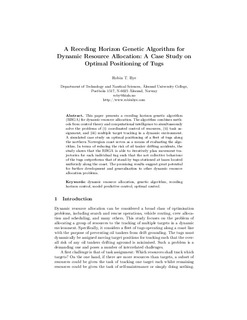A Receding Horizon Genetic Algorithm for Dynamic Resource Allocation: A Case Study on Optimal Positioning of Tugs
Journal article, Peer reviewed
Accepted version
Permanent lenke
http://hdl.handle.net/11250/2499019Utgivelsesdato
2012Metadata
Vis full innførselSamlinger
- Institutt for IKT og realfag [594]
- Publikasjoner fra CRIStin - NTNU [38055]
Originalversjon
Studies in Computational Intelligence. 2012, 399 131-147. 10.1007/978-3-642-27534-0_9Sammendrag
This paper presents a receding horizon genetic algorithm (RHGA) for dynamic resource allocation. The algorithm combines methods from control theory and computational intelligence to simultaneously solve the problems of (i) coordinated control of resources, (ii) task assignment, and (iii) multiple target tracking in a dynamic environment. A simulated case study on optimal positioning of a fleet of tugs along the northern Norwegian coast serves as a means of evaluating the algorithm. In terms of reducing the risk of oil tanker drifting accidents, the study shows that the RHGA is able to iteratively plan movement trajectories for each individual tug such that the net collective behaviour of the tugs outperforms that of stand-by tugs stationed at bases located uniformly along the coast. The promising results suggest great potential for further development and generalisation to other dynamic resource allocation problems.
